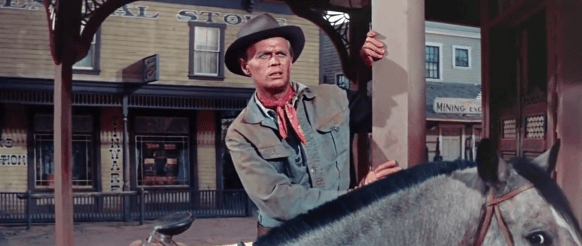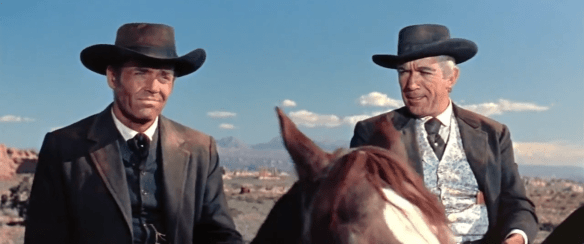
There are three names emblazoned over the title credits engulfing the screen: Richard Widmark, Henry Fonda, and Anthony Quinn. Somehow they all figure into this story — into the war that we are about to be privy to. The question remains, how so and on what sides? It turns out, it’s far from a clearcut answer.
As Warlock progresses, I couldn’t help but think of that quote: “Suppose they gave a war and nobody came?” Its variations have been attributed to individuals as diverse as Bertolt Brecht, Carl Sandburg, and the Vietnam-era Hippie movement. Regardless, the most overt sentiment remains the same. War is perpetuated by people who willingly show up to fight, whether it’s out of a sense of duty, an assertion of masculinity, personal advancement, or a desire to watch the world burn.
The San Pablo gang frequents Warlock quite often, prepared to terrorize a town and demoralize all those who stand for law & order, even to the point of death. The incumbent deputy sheriff is sent out of town on an honor guard of emasculation. He’s the most recent casualty, yet another man who will have his name crossed out on the brick wall of the jail. Because everyone is keeping tally. The whole town observes the public humiliation with distaste and private shame behind curtains and tucked away on second-story balconies.
Richard Widmark’s Gannon consorts with the rebels, but he doesn’t like it. He looks decidedly conflicted in their company. It’s his baby brother (a scrawny Frank Gorshin), who keeps him connected to the gang by association. We must come to decipher where his allegiances lie just as he does.
What a majestic pair Henry Fonda and Anthony Quinn make together as they trot toward Warlock. They give off a sense of having traversed much of the world. Hank’s been installed as the new Marshall famed for his golden-handled colt revolvers.
From years of experience, he predicts the local community will be pleased with him until it grows into a general resentment as he maintains such a high degree of autonomy. But as their town has already given itself over to anarchy and murder, this is a form of salvation at a very high wage. It remains to be seen if it’s worth the price.

In this way, Warlock courts themes not unfamiliar to Wichita or Man with a Gun. Director Jacques Tourneur’s sense of the town somehow felt more atmospheric and real, and then Robert Mitchum in the latter film was a singular hero without peer, ready to go to war alone. In Warlock, the talent is more substantial and as such, we get something slightly more complex, if not always more compelling or artful than Wichita, in particular.
One might be reminded that this is a Moab-shot western, and yet while there are some stunning exterior shots, what’s just as telling is how much of the movie takes place either in interiors or at the very least in the confines of the town. Director Edward Dmytryk finally ensconced again after the Hollywood Blacklist, looks far more engaged in the psychological underpinnings of his characters than he does in making the picture look pretty with sweeping grandstanding. The color schemes are bright if a bit gaudy, and the same might be said of the costuming.
But what does it matter in comparison to his characters? Even someone like Deforest Kelley has a say as a delightfully thuggish heavy with a wicked sense of humor. Then, the stage brings Dorothy Malone. She’s not exactly an antagonist, but she owns a vindictive streak having it out with Quinn in back parlor rooms over past grievances.
In another scene, she lays flowers at the perfectly constructed Hollywood grave of the murdered Bob Nicholson. What’s curious is the scriptural epitaph: How long, oh Lord?” It’s the implicit question at the heart of the story.
If she is one surprise inserted into the storyline, another is Gannon volunteering to become Deputy Sheriff. It’s not out of any amount of duplicity or self-lobbying. There’s a sense he legitimately wants to pursue law and order — standing tall, knowing he’s committed to veracity for once in his life. It should be noted Fonda is a Marshall, and the film makes a distinction. He is not bound by the same strictures.
Thus, Widmark becomes the fulcrum in the film’s dialogue covering all realms from law & order to the tenets of western masculinity. Where does Widmark get his teeth? Where does he get his sense of conscience? These questions might be up for debate, but to his credit, despite being the top-billed actor among a group of heavyweights, he’s brave enough in the role to come off as pitiful at times. It’s a deceptive performance, and I mean this as a compliment.
Since this is a western, albeit set mostly in a specific locality, there are very few female characters — only two of note — and the leading ladies are both blondes, conveniently mirroring one another as they pair off with the leading men. Jessie Marlow (Dolores Michael) is a creature of civility, who is surprised to find their hired gunman has a courteous manner. In his view, he practices with his pistols the way she practices the church organ. Their vocations are different, but as people, they have a surprising amount of common ground.
Likewise, it is Lily (Malone) who rebuffs Morgan (Quinn) due to his undying allegiance to Blaisedel (Fonda) only to turn her affections to Gannon. Again, it feels like a curious pairing, but if the other couple functions, then so can they.
If we are to analyze Warlock on a perfunctory level of criticism, the problem is that it has three climaxes, which means it possibly has none. However, there’s a nugget in here somewhere, and it’s couched in the ending. The whole movie is transmuted in the final visual summation. It’s announced by Henry Fonda with nary a word. If you want to call it a deconstruction of the West you can, a subversion of convention, that too, but what is it, if not a definitive statement?
Warlock is a talky western and perilously long, but in those final moments, it spits out our American genre back into the dust and leaves us to meditate on our corporate understanding of so many things. In Anthony Quinn, I see a character who is not willing to break with tradition. He is trapped in the habitual cycle of his ways, in a life that can never last, and out of preservation, he buries himself. It’s a tragedy, and not because he’s a cripple. Fonda has the whole town sing “Rock of Ages” out of deference to his lifelong companion.
Richard Widmark, time and time again, finds it within himself — this unexplainable compulsion to uphold the law — it’s as if once he pins on that badge, he’s devoted to his post. Whether it’s totally blind or not, he comes out of the picture with this peculiar kind of integrity we never would have expected. It’s not a flashy part, but it’s vital.
Finally, Hank Fonda. Good ol’ Hank. He feels like such an enigma for the entirety of the picture. He has that casual soft-spoken charm of his and yet he really is a vigilante; ironically, a symbol of chaos. It makes it all the more imperative to dwell on his final actions. I’m not sure if they’re warranted and from what we know of his character, I’m not sure they made sense. Maybe they do. But the image speaks volumes. It’s an ending to a western you won’t soon forget.
3.5/5 Stars

This is a very good western, complex and open to all types of readings and interpretations. I think the structure is problematic though with climax following on climax.
LikeLiked by 1 person
Pingback: The Law and Jake Wade (1958): Robert Taylor and Richard Widmark | 4 Star Films